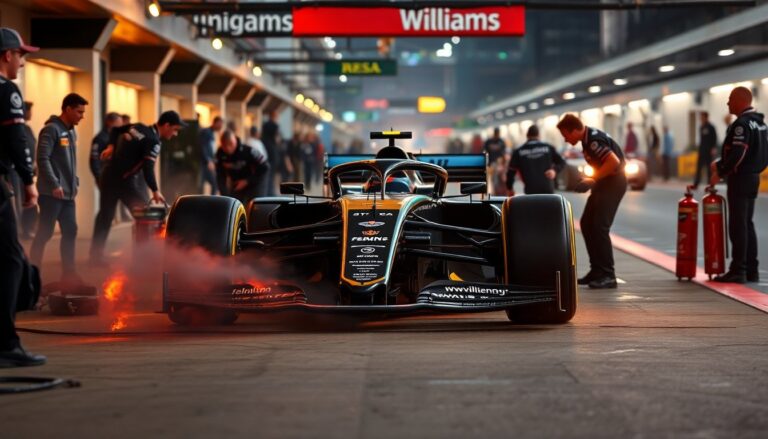Argomenti trattati
The Singapore Grand Prix weekend presented significant challenges for Williams Racing, particularly for driver Alex Albon. During the first practice session, Albon faced a critical setback when his car suffered a severe brake fire. This incident raised concerns among fans and teams, prompting investigations into the causes. Team principal James Vowles later provided insights into the situation, clarifying the hardware malfunction that triggered this alarming event.
The incident unfolds
As the weekend commenced at the renowned Marina Bay Street Circuit, Alexander Albon aimed to make a notable impression. However, the first practice session soon took a concerning turn. Just moments into the session, the car’s brakes ignited, resulting in a significant fire that interrupted his progress. This unforeseen incident attracted immediate attention, prompting fans and analysts to speculate on its implications for the remainder of the race weekend.
Initial reactions and safety concerns
The sight of Albon’s car engulfed in flames was alarming, raising essential safety concerns among the team and race officials. Such incidents can jeopardize not only the driver’s safety but also that of other participants on the track. Fortunately, prompt action from trackside marshals ensured the fire was quickly extinguished, preventing any serious injuries to Albon or others.
Vowles’ insights into the failure
Following the incident, James Vowles provided a comprehensive analysis of the situation. He indicated that the fire was caused by a specific hardware fault within the braking system. This finding was crucial, as it revealed the complexities inherent in high-performance racing machinery, where even minor malfunctions can lead to catastrophic results.
The technical breakdown
Vowles explained that the issue stemmed from a malfunction in a component vital to the braking system’s operation. The failure of this part resulted in excessive heat generation, ultimately igniting flammable materials nearby. Grasping this technical detail is essential, as it emphasizes the need for stringent testing and quality control in motorsport engineering.
Implications for the team
The brake fire incident involving Alexander Albon has raised significant concerns for the Williams team, affecting both their immediate race strategy and long-term considerations. Team principal James Vowles highlighted the importance of conducting a thorough investigation to prevent similar occurrences in the future. Such proactive measures are crucial in the competitive arena of Formula 1, where even minor details can dramatically impact race results.
Furthermore, Vowles assured fans and stakeholders of the team’s dedication to improving vehicle reliability. The incident has prompted a comprehensive review of current safety protocols and a reassessment of all components within the braking system. By addressing these vulnerabilities, Williams Racing aims to enhance performance and ensure their drivers compete without the apprehension of mechanical failures.
Looking ahead
Williams Racing is set to refine its strategy as it prepares for upcoming races. The lessons learned from Alexander Albon’s incident will significantly influence their approach. The team’s priority is to enhance car safety and reliability, ensuring that both drivers and fans can experience exhilarating races without the concern of unexpected technical failures.
The incident during the Singapore Grand Prix, while unfortunate, presents a crucial learning opportunity for the Williams team. Their commitment to resolving the hardware issues identified by team principal James Vowles is expected to strengthen their performance in future races, supporting their ambition to compete at the highest levels of Formula 1.

